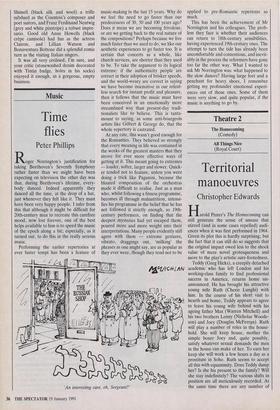Music
Time flies
Peter Phillips
Roger Norrington's justification for taking Beethoven's Seventh Symphony rather faster than we might have been expecting on television the other day was that, during Beethoven's lifetime, every- body danced. Indeed apparently they danced all the time, at the drop of a hat, just whenever they felt like it. They must have been very happy people. I infer from this that although it might be difficult for 20th-century man to recreate this carefree mood, now lost forever, one of the best helps available to him is to speed the music of the epoch along a bit; especially, as it turned out, to do this in the really serious music.
Performing the earlier repertories at ever faster tempi has been a feature of music-making in the last 15 years. Why do we feel the need to go faster than our predecessors of 30, 50 and 100 years ago? Does it mean we are becoming frivolous; or are we getting back to the real nature of the compositions? Perhaps because we live much faster than we used to do, we like our aesthetic experiences to go faster too. It is certain that concerts as a whole, like church services, are shorter than they used to be. To take the argument to its logical extreme: if the authenticity people are correct in their adoption of brisker speeds, and the world-weary are correct in saying we have become insensitive in our relent- less search for instant profit and pleasure, then it follows that the music must have been conceived in an emotionally more streamlined way than present-day tradi- tionalists like to believe. This is tanta- mount to saying, as some anti-bourgeois artists like Gilbert & George do, that the whole repertory is castrated.
At any rate, this wasn't good enough for the Romantics. They believed so strongly that every meaning in life was contained in the works of the greatest masters that they strove for ever more effective ways of getting at it. This meant going to extremes — louder, softer, larger and slower. Quick- er tended not to feature, unless you were doing a trick like Paganini, because the bloated composition of the orchestras made it difficult to realise. Just as a man who, whilst following a fitness programme, becomes ill through malnutrition, intensi- fies his programme in the belief that he has not followed it strictly enough, so 19th- century performers, on finding that the deepest mysteries had yet escaped them, poured more and more weight into their interpretations. Many people evidently still agree with them — extreme gestures, vibrato, draggings out, 'milking' the phrases as one might say, are as popular as they ever were, though they tend not to be `An interesting case, eh, Sergeant?' applied to pre-Romantic repertoire so much.
This has been the achievement of Mr Norrington and his colleagues. The prob- lem they face is whether their audiences can return to 18th-century sensibilities, having experienced 19th-century ones. The attempt to turn the tide has already been uncomfortable and contentious, and inevit- ably in the process the reformers have gone too far the other way. What I wanted to ask Mr Norrington was: what happened to the slow dances? Having large feet and a penchant for heavy shoes, I remember getting my profounder emotional experi- ences out of those ones. Some of them were very slow, and quite popular, if the music is anything to go by.


















































 Previous page
Previous page